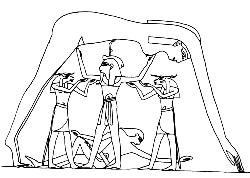
God of the earth, as son of Shu and Tefnut a member of the Ennead of Heliopolis. He was the husband of the sky goddess Nut. His children were Osiris, Isis, Nephthys and Seth. Many representations show the god lying down with Nut stretched out above him on hands and toes; sometimes they are separated by Shu, who supports the sky. Often Geb is coloured green, or vegetation is shown growing out of him. The fertility aspects associated with this are also emphasized by depictions of him with an erect penis pointing towards the sky. In addition to this positive side, the god also had a negative side. After all, the dead were buried or shut into his body, a terrible fate. In the Pyramid Texts, for example, appear the words 'the earth is an abomination for the deceased, he shall not enter into Geb so that he will not decay'. As god of the earth, Geb was also the lord of snakes, which lived in him; the products produced by the earth, such as plants and minerals, were also associated with him. Geb plays a special role in the story of the conflict between Horus and Seth. In many versions it is Geb who acts as judge. The Shabaka stone, for example, tells that the god originally decided to split control over Egypt equally between the two rivals, with Seth being granted Upper Egypt and Horus Lower Egypt. Later, Geb regretted his decision and allocated the entire country to Horus. Because Geb himself was the last ruler on earth, and the living king was the personification of Horus, the latter was often called the heir of Geb.